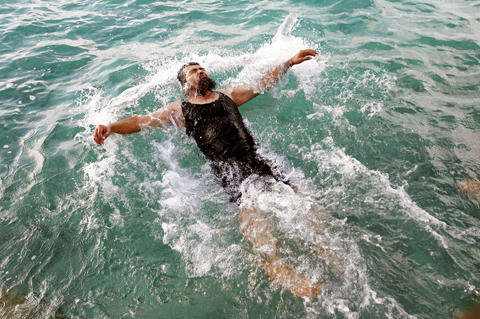The four men in short-sleeve shirts looked like ordinary tourists, enjoying a Sunday lunch and butter pecan ice cream afterward as they observed the sparkling waters surrounding the Atlantic resort island.
But they are Uighurs, Muslims from the vast stretches of western China, an arid and rugged land that is a far cry from Bermuda’s sandy beaches and quaint narrow streets lined with pastel Victorian-era buildings.
They once were terrorism suspects, but even after Washington determined the men weren’t a threat to the US, they were kept at the Guantanamo prison for years because no nation would take them — until a few days ago, when Bermuda agreed to let them in as refugees.

PHOTO: AP
“When we didn’t have any country to accept us, when everybody was afraid of us ... Bermuda had the courage and was brave enough to accept us,” said Abdulla Abdulgadir, who at 30 is the youngest of the four men who relished their first weekend of freedom in seven years.
Abdulgadir eagerly embraced his new island home.
“We are not moving anywhere,” he said.
He and his companions have traded drab prison jumpsuits for comfortable cotton pants and knit shirts, and razor wire-encircled jail compounds for beach cottages. They hope to quickly find jobs in Bermuda — one of the world’s wealthiest places because of its financial and insurance sector — and eventually start families.
The four Uighurs also have immediate priorities, such as learning to drive, scuba dive and bowl, said Glenn Brangman, a former military official who is helping reintroduce them to the world outside prison.
“I told them one step at a time,” Brangman said. “They’re beginning to live all over again.”
For these four, the arrival in Bermuda appears to be the end of a difficult journey. Thirteen other Uighurs at Guantanamo are hoping to move to the Pacific island nation of Palau.
All of them were captured in Pakistan and Afghanistan as suspected allies of the Taliban and al-Qaeda, but the men claimed they had only fled oppression by China and were never enemies of the US.
“We only have one enemy, and that’s the Chinese,” one of the men, Ablikim Turahun, told a military tribunal in 2004. “They have been torturing us and killing us all: old, young, men, women, little children and unborn children.”
US officials eventually declared the Uighurs innocent of any wrongdoing and authorized their release, but they couldn’t be sent back to China because US law forbids deporting someone to a country where they are likely to face torture or persecution.

DOUBLE-MURDER CASE: The officer told the dispatcher he would check the locations of the callers, but instead headed to a pizzeria, remaining there for about an hour A New Jersey officer has been charged with misconduct after prosecutors said he did not quickly respond to and properly investigate reports of a shooting that turned out to be a double murder, instead allegedly stopping at an ATM and pizzeria. Franklin Township Police Sergeant Kevin Bollaro was the on-duty officer on the evening of Aug. 1, when police received 911 calls reporting gunshots and screaming in Pittstown, about 96km from Manhattan in central New Jersey, Hunterdon County Prosecutor Renee Robeson’s office said. However, rather than responding immediately, prosecutors said GPS data and surveillance video showed Bollaro drove about 3km

‘MOTHER’ OF THAILAND: In her glamorous heyday in the 1960s, former Thai queen Sirikit mingled with US presidents and superstars such as Elvis Presley The year-long funeral ceremony of former Thai queen Sirikit started yesterday, with grieving royalists set to salute the procession bringing her body to lie in state at Bangkok’s Grand Palace. Members of the royal family are venerated in Thailand, treated by many as semi-divine figures, and lavished with glowing media coverage and gold-adorned portraits hanging in public spaces and private homes nationwide. Sirikit, the mother of Thai King Vajiralongkorn and widow of the nation’s longest-reigning monarch, died late on Friday at the age of 93. Black-and-white tributes to the royal matriarch are being beamed onto towering digital advertizing billboards, on

Tens of thousands of people on Saturday took to the streets of Spain’s eastern city of Valencia to mark the first anniversary of floods that killed 229 people and to denounce the handling of the disaster. Demonstrators, many carrying photos of the victims, called on regional government head Carlos Mazon to resign over what they said was the slow response to one of Europe’s deadliest natural disasters in decades. “People are still really angry,” said Rosa Cerros, a 42-year-old government worker who took part with her husband and two young daughters. “Why weren’t people evacuated? Its incomprehensible,” she said. Mazon’s

POWER ABUSE WORRY: Some people warned that the broad language of the treaty could lead to overreach by authorities and enable the repression of government critics Countries signed their first UN treaty targeting cybercrime in Hanoi yesterday, despite opposition from an unlikely band of tech companies and rights groups warning of expanded state surveillance. The new global legal framework aims to bolster international cooperation to fight digital crimes, from child pornography to transnational cyberscams and money laundering. More than 60 countries signed the declaration, which means it would go into force once ratified by those states. UN Secretary-General Antonio Guterres described the signing as an “important milestone,” and that it was “only the beginning.” “Every day, sophisticated scams destroy families, steal migrants and drain billions of dollars from our economy...